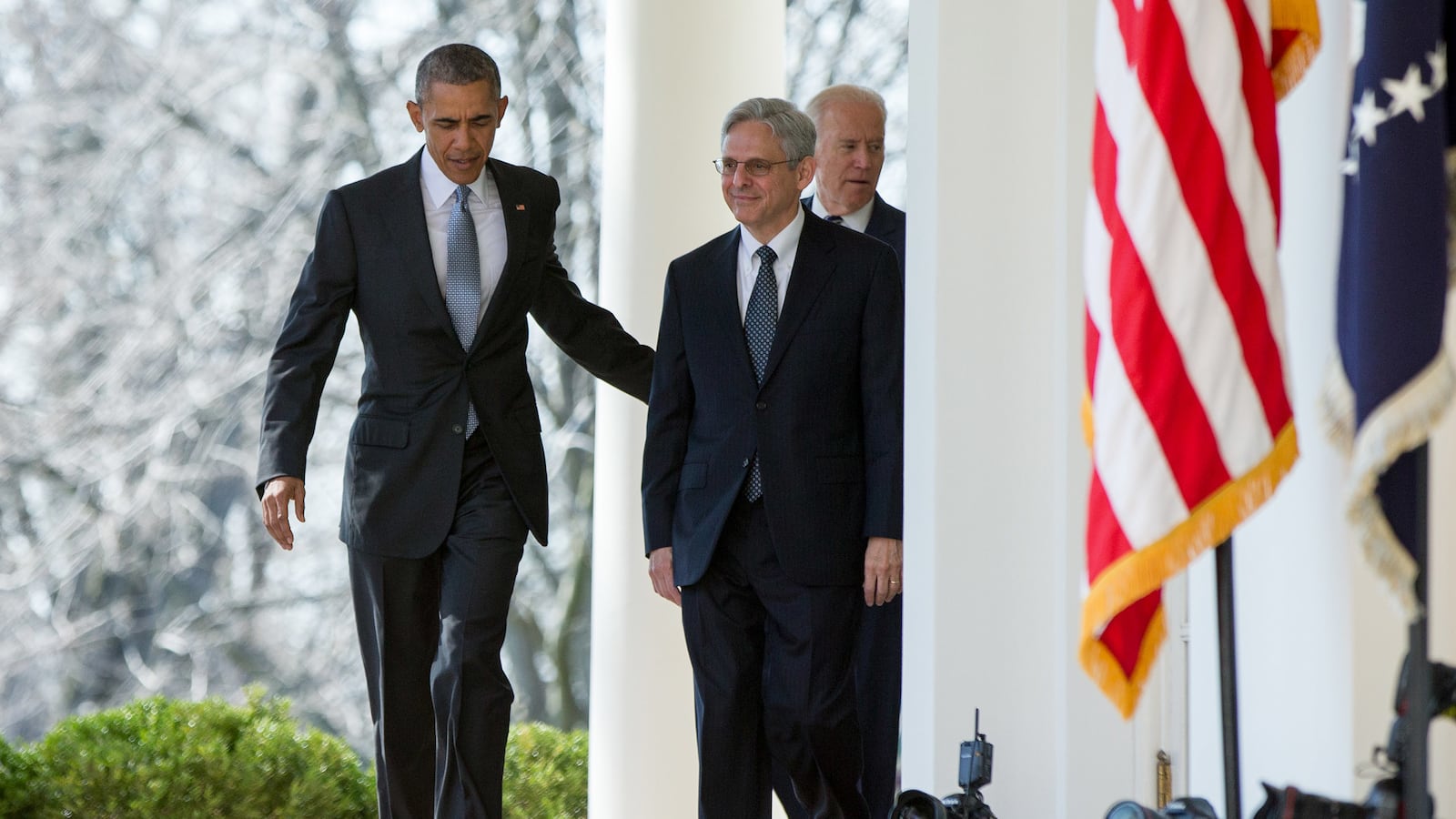If Republicans won’t even meet with President Obama’s Supreme Court nominee, Judge Merrick Garland, and refuse to vote on his nomination, it seems like the president is out of options.
Yet while the president may not be able to compel hearings, he does have a nuclear option available: force the Senate into session when its members would rather be out campaigning.
Article II, Section 3 of the Constitution states that the president “may, on extraordinary Occasions, convene both Houses, or either of them, and in Case of Disagreement between them, with Respect to the Time of Adjournment, he may adjourn them to such Time as he shall think proper.”Based on past cases, what counts as an ‘extraordinary Occasion’ is almost entirely up to the president. “It appears that it is within the president’s unchecked discretion,” According to the redoubtable Lyle Denniston at SCOTUSBlog, given that broad leeway, it’s easy to see how a prolonged period of an eight-person Supreme Court could count as “extraordinary.”
For example, Obama could argue, a run of 4-4 deadlocks, like last week’s crucial public-sector unions case, could lead to unsettled law, and uneven practice, on everything from immigration to abortion to Obamacare. The whole reason the Court has taken these cases is that circuit courts disagree, after all. So what’s legal in Texas is illegal in Illinois, with no guidance from the Supreme Court. That is extraordinary.
The short-handed Court could also begin to bend under the heavy workload. To take but one example, the justices generally parcel out last-minute death penalty appeals. If even a single such appeal cannot be adequately reviewed because of short staffing, that, too, would be extraordinary.
Worst of all, imagine a contested presidential election in November—like Bush v. Gore on steroids. It’s not hard to see this happening in light of recent voting shenanigans in Arizona, Donald Trump’s love of litigation, and the real possibility of a credible third-party presidential run. And there is nothing more extraordinary than a deadlocked court unable to enable the transition of power.
Nor would an “extraordinary session” be new: it’s happened 46 times in American history. (46 for the Senate alone, 28 for both the Senate and the House.) It may be unfamiliar, since the last time was under President Truman, but it’s hardly unprecedented.
And many of them were much more thinly justified than Obama’s would be. In 2008, for example, Republicans wanted President Bush to call an extraordinary session for Congress to discuss soaring gas prices (remember those?). And President Truman’s call, during the 1948 election season, was in fact a baldly political stunt meant to expose Republican inaction on civil rights.
So it seems that the president would be well within his authority to convene an “extraordinary session.” What would happen then?
Well, either the Senate would convene or it wouldn’t. If it didn’t convene, that would be a true constitutional crisis: one branch of the government denying the clear authority of another. (Of course, Republicans would say that Obama, the “imperial president,” started it—yet another way the party has come to resemble its putative presidential candidate.)
It would also be grounds for a Supreme Court case, filed by the White House, demanding that the Senate obey the president’s order. If the Court ruled in Obama’s favor and the Senate still didn’t convene, it would be disobeying both the executive and judicial branches of government—ironically, all the name of a pseudo-constitutional argument that “the people” only elected President Obama to a three-year second term.
Whatever electoral consequences Senate Republicans face now, they’d surely be punished fourfold for violating a direct order from the Supreme Court and the White House combined. It would make the Clinton Impeachment seem like a class in civics.
So let’s suppose the Senate does convene. What then?
Probably nothing.
As commentators have noted, the “speech and debate” clause of the Constitution makes it very hard to compel the Senate to do anything at all. Just as President Obama has wide discretion in calling them to convene, so the Senate leadership has wide discretion in deciding how to do its business.
Indeed, “nothing” is what happened in 1948; Republican Sen. Robert Taft simply blocked all votes from taking place. Perhaps the GOP would take a cue from House of Cards and issue a slow-motion “quorum call,” taking attendance for hours, or even days. Perhaps Ted Cruz would read Dr. Seuss again. Anything other than actually issue advice and (non-)consent on Obama’s nominee.
But that still would be quite a show: noisy Democrats demanding action on a Supreme Court nominee, and obstinate, Koch-funded Republicans reading from the phone book. And it would keep this issue alive in the minds of easily-distracted voters.
Most importantly, convening an extraordinary session would at least somewhat take the senators off the campaign trail, which is where they’ll want to be in September and October, and effectively hold them hostage in Washington during prime campaign season. Practically speaking, they’d find a way out of it—there are infinite procedural ways to avoid actually showing up for work in the Senate— and, of course, Democrats would be just as stuck as Republicans. But they would have to do something, rather than adjourn as usual.
Of course, such a confrontational position might poison whatever appetite Senate Republicans have for a lame-duck confirmation. And there’s reason to believe that may be Obama’s strategy all along: nominate someone who eventually will look better than the alternative. Maybe this is just a waiting game.
If not, though, President Obama is not out of options. The Senate has the power to say no, over and over again. But the President has the power to make them do it.






